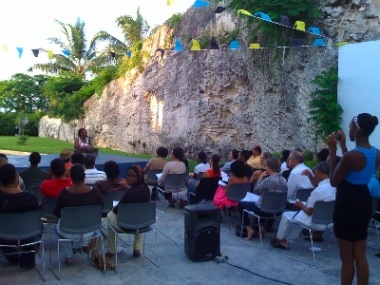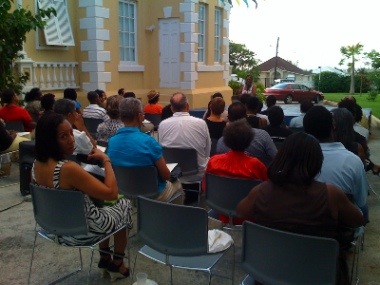First things first. This post
is being was written in the knowledge that it might never get posted, simply because it's going to be critical and in contravention of my terms of employment -- in other words, flying in the face of General Orders. So if you're seeing it, (a) I'm no longer a government employee; (b) I no longer care what the consequence is; or (c) I'm dead. Or all of the above.But I'm writing it because it needs to be said.I
've been was a civil servant for five years. The specific position I
hold is held was part of the problem, but it's not all of it. The political persuasion I
hold held, real or perceived,
is was also part of the problem, but not all of it. The fundamental problem was that the system of government that is responsible for the development, promotion, sustaining and honouring of Bahamian culture is, quite simply (and I say this, borrowing unashamedly from other people's military and begging forgiveness for all those who are offended or outraged by "Language"),
FUBAR.Here's how it works, or doesn't.

Everything worth doing requires money. This is especially true for culture, which, in spite of popular misconceptions about it, is in many ways a business that has been around for centuries. And as with anything else, in the cultural field, you tend to get what you pay for. That's not always true, of course — a
Brent Malone painting during his lifetime was far more reasonable a purchase than a
Chan Pratt painting during his, but that was due far more to the philosophy and sensibility and target audience of the specific artists than much else, and the two prices may adjust themselves now that both painters have sadly passed on. But in most cases, it is true.

The thing is, The Bahamas Government doesn't appear to see it that way. This is a problem that seems to be at the root of every decision made by every decision-making agency in the country. The main question at hand has nothing to do with seeking value for money; rather, the average civil servant aims to spend as little money as possible in one go, even if that means that what is purchased with that money is so low in quality that you have to buy it again and again and again.Now I know that this isn't unique to our government, that many governments suffer from the same malaise. That doesn't make it any better. And when it comes to culture, it grows even more difficult.Because, you see, culture isn't something that (a) most Bahamians seem to believe can/should be paid for and (b) most civil servants know very much about. (Let me stop right here to say that point (a) only applies to local culture; most Bahamians are avid consumers of global culture, and in fact we often spend far more than we need to on designer thisses and thats, on going to see foreign performers and shows, no matter how mediocre, on films we import, on cable stations that feature the cultural products of abroad. What we will not spend our money on is our own people and their cultural productions -- at least not unless/until foreigners spend their money on them first, as with
Amos Ferguson. But I digress.)

Most civil servants, in fact, labour under the impression that cultural production is some sort of fancy hobby, something that anybody can do, and worse, that people enjoy doing, and so they resist the idea of paying for it in any way, shape or form. Accountants are particularly prone to this misapprehension, but they're not alone; senior civil servants and politicians also hold it (except, in the case of politicians, when it comes to Junkanoo, and in most cases that exception is made because (a) they believe that only what is popular is good or (b) they need the votes).It makes for difficult times if you're the Director of Cultural Affairs for the government.I have spent my time as Director apologizing for my government, especially to professionals who, if they were in any other field, would be given red carpet treatment because of their stature. The same people who kowtow to ministers because they have blue licence plates, official cars, and drivers scoff at the demands of people -- professional people, mind you, with training or experience or a lifetime of performance under their belts, or all three -- to be paid what they are worth in the cultural field. These are the same people who think nothing of paying thousands of dollars for refreshments or decorations or the sound systems or seating for an event (accountants are not included in the above; most accountants of my acquaintance query all expenditure -- it's their job). But when it comes to the live entertainment, forget it.This is usually how the conversation goes.
Government: We need a cultural show for
[insert event of choice: visiting dignitaries, international conference, national celebration, CARIFESTA]Me: All right. I'll send you a budget. I'll let you know what it costs so you can build it into your expenditure.
Government: ... A budget?
Me (if it's a good day): Yes. Cultural shows cost money.
(If it's a bad day, I'm not responsible for my reply)Government: We thought your department would pay for it.
Me (after laughing hysterically and making a close acquaintance with the floor): You're kidding, right? My department doesn't even have a permanent home, you're thinking we have funding to pay for every event that comes across your desk? The Director of Culture may be the only director in the entire government system that doesn't get a courtesy car along with the office, and you think we have the funding to cover the cost of your show? No, I'll send you the breakdown and you add it to your Cabinet Paper.
(I'm thinking: you're going to pay for everything else, from the sound system to the conference facilities, from the catering to the little folders and the goodies you're going to be handing out to the people attending, but you want me to provide the entertainment for you for FREE?)Government (doubtfully): Okay, send it, we'll take a look at it.
(Time passes. Then we get one of the following communications.)A)
Government: Okay, we've gone over your budget, and it's fine. Except for one thing. Do the performers have to cost so much? Can't you get people to perform for less?
(Translation: can't we get somebody to perform for free?)B)
Government: Okay, we've gone over your budget. We think we're going to go with the Police Force Band/the Defence Force Band/one of the above's Pop Band
(Translation: we don't want to spend taxpayers' money on anybody who isn't already making a salary and has a pension coming after they retire, so we'll get in-house talent)C)
Government: We've decided we don't need a cultural show after all.
(Translation: we wouldn't pay a working artist a fair price if it killed us.)This notwithstanding the fact that if you invest in cultural performance, and if the performance is high-quality, and if you make people feel good or different or better or bigger (which cultural performance aims to do), you get a tangible return. People pay for that kind of experience, and they pay big. If they didn't, there wouldn't be a Hollywood film industry, there wouldn't be a Broadway in New York, and there most certainly wouldn't be Las Vegas, whose reputation is not all built on casinos and gaming tables. People are always looking for a different experience, something unique, something you can't get anywhere else, and the better and more unique and more different it is, the more they'll pay. It's called show business for a reason, folks, and it runs by a tried-true formula that works.And The Bahamas is so very rich in culture that we could all be benefitting from it.But we're not. Part of the problem is what I've just described above. There's a fundamental lack of respect for what we creative people do across every sector of our Bahamaland, and we are dissed on so regular a basis that I'm surprised that we stay here. The disrespect that is shown to Bahamian artists and cultural workers is played out in any number of ways, from the politicians' laughing about us in the House of Assembly, to the civil servants' disparaging remarks about artists and singers and shows, to the businessmen's opinion that what we do is a waste of good capital, to the average churchgoers' dismissal of the artistic lifestyle (if the artist doesn't happen to be part of the church membership of course, and providing entertainment aka praise and worship for the church itself), to the salaries not paid and the budgets not awarded and the promotions not given to those people who bust their behinds for the culture of the country day in, day out, with no questions asked and no rewards requested.They say what goes around comes around in the end. They say, too, that time is longer than rope. And the fact that we're now in the twenty-first century in the middle of a global creative revolution suggests that the typical Bahamian attitude to artists, art, and creativity is heading us all for a big, hard crash.There gatta be a better way. Arts and culture make good business. There gatta be space in this nation, in this society, for artists, for creativity; after all, the way of the world now depends on innovation, uniqueness, difference. There gatta be investment in new ways of seeing, fresh ideas. There gatta be room for critical commentary and flights of fancy in this Bahamaland of ours. There gatta be room for creative people to make a living being creative. We will not always be able to make money by transplanting other people's bright ideas. Our business, our main industries, our economy all depend on our best creative minds. And so, politicitians, businessmen, accountants, civil servants, churchpeople, Bahamians, consider rethinking your prejudices and resistances to the culture within us. It's yours too, you know. We artists just help you see it.And who knows? You might just love it as much as all the other people's culture you've already paid top dollar for.










